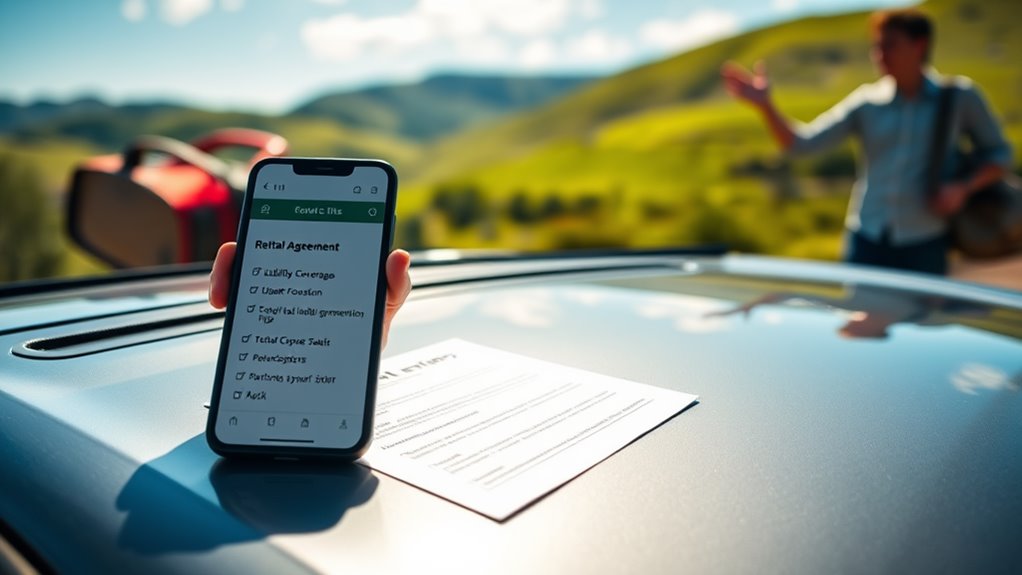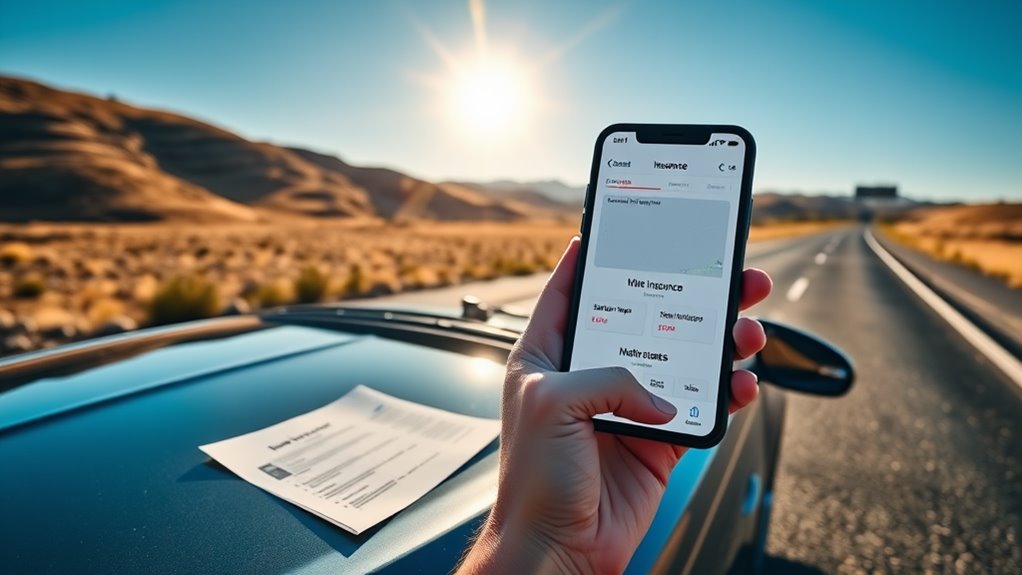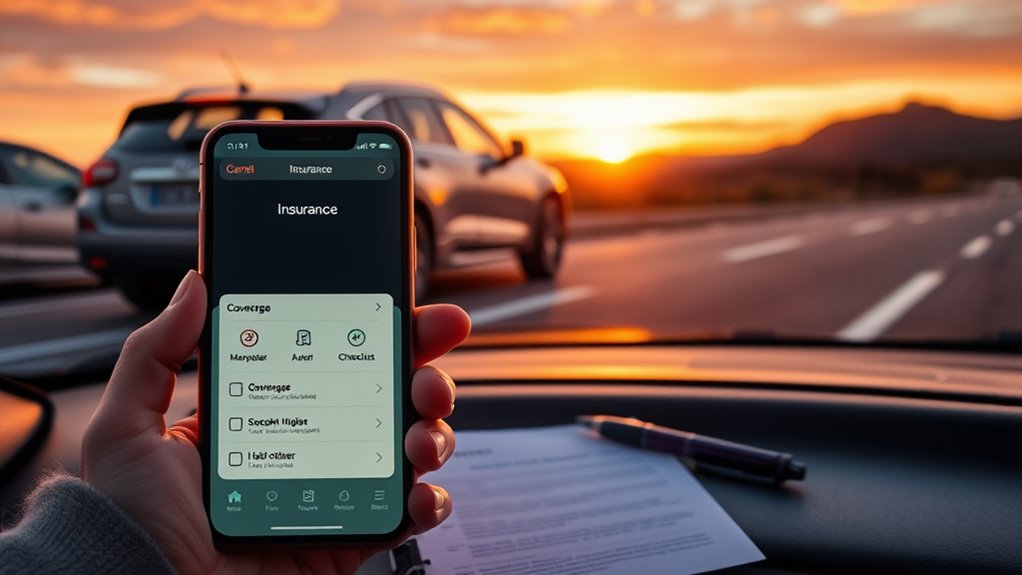Steering through the nuances of liability coverage for rental vehicles can feel like a delicate dance. To guarantee you're adequately protected, it's essential to understand the various options available to you. From checking your personal auto insurance policy to exploring supplemental coverage, there are several strategies to reflect upon. What you might discover could greatly impact your financial security and peace of mind when renting a vehicle.
Key Takeaways
- Verify your personal auto insurance policy to ensure it covers liability for rental vehicles, both in the U.S. and Canada.
- Review the rental agreement for any supplemental liability insurance options, noting any exclusions or specific terms that may apply.
- Consider using a credit card that offers rental car insurance benefits to enhance your liability coverage without additional costs.
- Check local regulations when renting abroad, as insurance requirements vary by country and may differ from U.S. standards.
- Manage costs by seeking discounts for longer rentals and adjusting your coverage based on your personal insurance and rental duration.
Understand the Basics of Liability Coverage

When you're renting a vehicle, understanding liability coverage is vital, as it determines your financial protection in the event of an accident.
Liability insurance generally extends from your personal auto policy to rental cars, covering damages or injuries you cause to others. This protection is important as it shields you from potential lawsuits and covers both property damage and bodily injury liability. Additionally, it's crucial to remember that personal auto insurance may also cover rental vehicles within the U.S., potentially providing you with adequate protection during your rental period. Furthermore, you should be aware that non-owner car insurance can also offer coverage for those who frequently rent vehicles but do not own a car.
Liability insurance from your personal auto policy covers damages and injuries to others when renting a vehicle, protecting you from lawsuits.
Rental companies offer minimal coverage mandated by law, but you can purchase supplemental protection for enhanced security. Remember to check your existing policy limits to guarantee they adequately protect you during the rental period.
Factors like the vehicle type, rental duration, and state laws can also influence your liability coverage needs. Always assess these aspects before renting.
Evaluate Your Current Auto Insurance Policy
Before renting a vehicle, it's crucial to evaluate your current auto insurance policy to understand how it extends to rental cars. Knowing the specifics can save you from unexpected expenses and coverage gaps.
Here are key aspects to take into account:
- Coverage Scope: Confirm if your policy covers liability and damages for rentals.
- Geographical Limits: Verify your coverage applies in the U.S. and Canada, not just abroad.
- Business Use: Check if your policy excludes rentals for business purposes.
- Deductibles: Be aware that using your insurance may lead to deductibles and premium increases.
- Comparison Shopping: Weigh rental insurance costs against your existing policy for potential savings.
Check for Rental Vehicle Coverage in Your Policy
How can you be sure you're adequately covered when renting a vehicle? First, review your auto insurance policy to confirm it includes rental vehicle coverage.
In Minnesota, for instance, your policy must cover rentals unless stated otherwise. Look for extensive and collision coverage, which may extend to rentals, but check for any deductibles.
It's also wise to explore credit card benefits, as some cards provide rental insurance that could help with costs. Pay attention to policy exclusions, especially for long-term rentals or specific vehicle types.
If your personal policy doesn't cover a rental, consider purchasing additional insurance from the rental company, ensuring you're not duplicating existing coverage. Always clarify your coverage with your insurer before renting.
Consider State Minimum Liability Requirements

Understanding your personal auto policy is just the beginning; knowing your state's minimum liability requirements is equally important when renting a vehicle. Each state has distinct laws that dictate coverage obligations, and these can greatly affect your financial responsibility in an accident.
Understanding your state's minimum liability requirements is crucial for managing financial risks when renting a vehicle.
- Varying Coverage Limits: States set different minimums for bodily injury and property damage.
- Primary Liability: In some states, rental companies must provide primary coverage.
- Exceptions Exist: Certain conditions may exempt companies from liability.
- Commercial Vehicles: Different rules apply to commercial rentals.
- Stay Updated: Laws evolve, so keep informed on changes in your state.
Explore Supplemental Liability Insurance Options
While renting a vehicle, exploring Supplemental Liability Insurance (SLI) options can greatly impact your overall financial protection.
SLI is an optional policy that provides additional liability coverage for third-party claims, with limits typically ranging from state minimums to $500,000. Before purchasing, check your personal insurance to see if it extends to rentals; sometimes, umbrella policies already cover you adequately.
Assess your risk tolerance and consider the cost of SLI against potential benefits. Remember, coverage doesn't apply in Mexico and may exclude damages to the rental vehicle itself.
Always read the rental agreement carefully to understand any specific terms or exclusions, ensuring you're fully informed before making a decision.
Utilize Credit Card Benefits for Rental Insurance
When renting a vehicle, leveraging credit card benefits for rental insurance can provide significant financial advantages. Many credit cards offer coverage that can save you money and hassle, but it's crucial to understand the specifics.
Leveraging credit card benefits for rental insurance can save you money and reduce hassle when renting a vehicle.
- Collision Damage Waiver (CDW): Often included, covering damage to the rental car.
- Decline Rental Company Coverage: You must decline CDW from the rental company to use credit card benefits.
- Primary vs. Secondary: Some cards offer primary coverage, avoiding claims on your personal auto insurance.
- Geographical Limitations: Coverage can vary by location, so check your card's terms.
- Documentation Required: Be ready to provide the rental agreement and police report when filing claims.
Utilizing these benefits can enhance your rental experience while minimizing costs.
Investigate Third-Party Rental Car Insurance

As you navigate the world of rental vehicles, investigating third-party insurance becomes essential for ensuring you're adequately protected against potential liabilities.
Third-party insurance is often mandatory, covering damages to others' property and medical expenses resulting from accidents. In many regions, like Europe and Australia, this coverage is included in rental agreements, while in the US, the driver typically bears responsibility.
Minimum coverage limits vary widely, with some areas requiring more extensive policies than others. Understanding these differences can enhance your protection against financial penalties and legal repercussions.
Additionally, you might want to explore supplemental options to increase your liability limits, ensuring you're not left vulnerable in the event of an accident.
Compare Costs of Rental Company Insurance vs. Other Options
Maneuvering the costs of rental company insurance versus other options can greatly impact your total rental expenses.
When you consider the various coverage types and their costs, it's crucial to evaluate what suits your needs best.
- Rental company insurance can add $20 to $40 per day.
- Credit cards might offer rental coverage, but terms vary widely.
- Personal auto insurance typically extends to rentals, but with potential gaps.
- Long-term rentals make purchasing insurance less cost-effective.
- Luxury or commercial rentals may require additional coverage.
Assess Coverage for International Rentals
Understanding your liability coverage options becomes even more important when renting vehicles internationally. Every country has different liability requirements, so you need to research these before your trip.
Understanding liability coverage is crucial when renting cars abroad, as each country has unique requirements.
Check your credit card policies too; some offer primary coverage for rentals, but this may not extend to liability abroad. Most U.S. personal auto insurance won't cover you outside the U.S., except possibly in Canada and Mexico.
Rental companies often provide liability insurance, sometimes required by law in certain countries. Pay attention to local regulations to guarantee compliance and avoid legal issues.
Evaluate the types of coverage available, such as third-party liability or compulsory insurance, and consider additional options to mitigate potential financial risks.
Manage Your Insurance Costs Effectively
Managing your insurance costs effectively requires a strategic approach to understanding your options and existing policies.
To enhance your rental vehicle insurance expenses, consider these key strategies:
- Seek Discounts: Look for rental company discounts, especially for longer rentals or loyalty memberships.
- Leverage Credit Cards: Use credit card insurance benefits to reduce extra coverage fees.
- Differentiate Use: Clearly distinguish between personal and business use to guarantee ideal coverage.
- Avoid Duplication: Review your current policies to sidestep unnecessary overlap in coverage.
- Tailor Your Coverage: Adjust your insurance based on rental duration, vehicle type, and your personal insurance situation.
Conclusion
In conclusion, traversing liability coverage for rental vehicles doesn't have to be intimidating. By thoroughly evaluating your current insurance, considering supplemental options, and understanding state requirements, you can guarantee you're adequately protected. After all, why gamble with your financial security when a little due diligence can safeguard your peace of mind? With these insights, you're well-equipped to make informed decisions, turning potential risks into manageable solutions as you hit the road with confidence.





